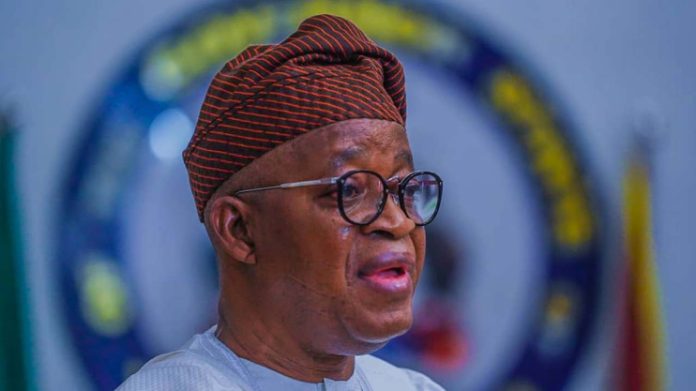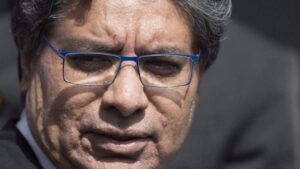
The All Progressives Congress (APC) has asked the Court of Appeal, Abuja division to set aside the decision of a Federal High Court and affirm the nomination of Governor Isiaka Oyetola of Osun State and his deputy, Benedict Alabi as the APC’s candidate in the July 16 governorship election.
The party also prayed the appellate court for a stay of execution on the judgment pending the hearing and determination of its appeal.
The appellant said it is in the interest of justice that the 2nd defendant’s right to a fair hearing be preserved pending the determination of the appeal.
That the application to maintain the status quo pending the determination of the applicant’s appeal is paramount and inevitable as the grounds of appeal raise issues of substantial points of law with a high possibility of success on the appeal.
Justice Emeka Nwite had, in a judgment, nullified the candidacy of Oyetola and his deputy governorship candidate, Benedict Alabi, on grounds that Gov. Mai Mala Buni of Yobe, who submitted their names to the Independent National Electoral Commission (INEC) violated the provisions of Section 183 of the Constitution of the Federal Republic of Nigeria and Section 82(3) of the Electoral Act, 2022.
The court said that the decisions taken by Governor Buni, including forwarding the names of Oyetola and Alabi to INEC, amounted to a nullity in law.
Justice Nwite’s judgment was the subject of a suit marked: FHC/ABJ/CS/468/2022, filed by the Peoples Democratic Party against Governor Mai Mala Buni, Governor Isiaka Oyetola, his deputy, Benedict Alabi and INEC.
But in a notice of appeal dated October 4, 2023, the APC challenged the entire judgment of the trial court and urged the Court of Appeal to set it aside and allow its appeal.
The APC in its notice of appeal filed through its counsel, Dr Abiodun Layonu (SAN) and Abdulfatai Oyedele argued that the PDP which brought the action lacked the requisite locus standi to have instituted the suit.
According to the appellant, “by the provision of section 84(14) of the Electoral Act, 2022, it is only an aspirant who participated in the primary election that can complain that the provision of the Act and the guidelines of the political party have not been complied with in the selection or nomination of a candidate of a political party for an election.
It stressed that by section 284 (14) (1) of the 1999 constitution only empowers a political party to challenge INEC’s action, where it fails to comply with the provision of the Act, in respect of the nomination of its candidates.
The appellant, therefore, urged the court to set aside the judgment of the trial court because the plaintiff (PDP) lacked the locus standi to bring any cause of action that relates to the internal affairs of the appellant.
That the findings of the trial court that INEC ought not to have accepted the nomination of its candidates is erroneous, perverse and occasioned a grave miscarriage of justice.
It further contended that the originating summons, affidavit in support, and reliefs sought by the plaintiff (PDP), are all completely centred on the internal affairs of the appellant, and the law is trite that issues strictly on the internal affairs of a political party are not justiciable in a court of law.
“That the trial court erred in law when it held that the plaintiff’s (PDP) cause of action does not relate to the internal affairs of the appellant and as such justiciable.
“That the trial court erred in law in its decision that the 1st respondent’s (PDP), the suit is not caught by the doctrine of issue estoppel is perverse and has occasioned a miscarriage of justice.
“It equally contended that the trial court lacked the jurisdiction to adjudicate upon the suit as the action was statute barred because the act complained by the 1st respondents (PDP), came into existence on or before March 18, 2022, and not March 25, 2022.”
APC argued that the court’s decision that the cause of action arose on March 25, 2023, to hold that the suit was not statute-barred was perverse and occasioned a miscarriage of justice.
That the trial court erred in law when it held that INEC ought not to have accepted the nomination of Governor Oyetola and his deputy, Alabi, and thereafter disqualified them from participating in the Osun State Governorship election.
APC equally contended that the trial court’s reliance on sections 82 (3) 84 (13) and 29 of the Electoral Act, 2022, to disqualify its candidates was erroneous and perverse and thereby occasioned a miscarriage of justice.
That it did not admit anywhere that the members of the defunct Caretaker Committee/Extra-Ordinary Planning Committee(CCEPC) coordinated the primary that produced the 3rd and 4th respondents as the appellant Governorship candidates and no such issue was raised by the PDP.







